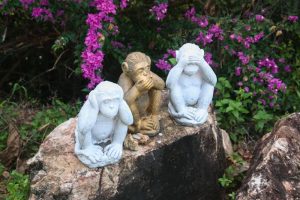Last Saturday I spent the day helping a wildlife rehabilitator secure a fence surrounding the deer enclosure at her animal sanctuary in Florida.Seven orphaned deer mill about in their heavily treed area, frolicking and nibbling on plentiful plants. Bucky and his sister were just two weeks old when their mother was killed by a car. Bucky is 10 months old now and thinks he’s a hot stag because his antlers are growing in. Bucky likes to show off his protruding bony nubs by “bucking” anyone in his space. He charged me in the buttocks, but soon I became an object of affection when he mistook my forearms for a salt lick.The wildlife center is nestled among palm trees, big oaks and lush Florida foliage – fairly secluded on a few acres. It’s peaceful and quiet – except for Frosty, the white and yellow Cockatoo. Frosty is one of five domestic birds living in huge outdoor cages on the grounds. Humans purchased the birds as pets and later discarded them for whatever reason. Perhaps Frosty annoyed his former owner with his loud screeching demands for attention. “MOTHER, MOTHER,” he yelled in a voice emulating Bobcat Goldthwait.Frosty calmed down when I walked into his cage and began stroking his fluffy white head. It was our first encounter, and he insisted on proper introductions. “Name is Frosty, name is Frosty, name is Frosty,” he repeated, in a throaty but softer tone. “Name is Marylou, name is Marylou,” I said, in my Frosty imitation. “Name is Frosty, name is Frosty,” he responded. And so it went for 15 minutes. I didn’t mind; I’ve had less intelligible conversations with elected officials.Other creatures that have found temporary quarters at the sanctuary include sea turtles, gopher tortoises, rabbits, a skunk and a possum. All of them were brought to the center with injuries inflicted – directly or indirectly – by man. With the exception of the birds and a few other permanent residents, including six or seven cats, they will eventually be released to Mother Nature.It’s not easy to let go. We fear for their safety; yet, they are not ours to “own.” They are creatures of the earth – not pets.Yea, pets, another subject.Pets and humans, for the most part, have a closer bond than wildlife and humans; however, their demise at our hands has equaled the fate of their wild relatives.The Humane Society of the United States reports that 6 to 8 million dogs and cats enter animal shelters each year in this country. Three to 4 million dogs and cats are euthanized each year.The exotic animal trade is nothing but hedonism. The number of reptiles kept as pets increased by 2 million last year to 11 million. How greedy we are to domesticate wildlife when millions of dogs and cats die each year simply because they have no homes.I believe we need to ban all animals as pets except dogs, cats and small birds – grandfather in those already in our homes. I’m not talking about horses, llamas and donkeys. But forget about hamsters, ferrets, turtles, snakes, mice, rabbits, pigs and so on. I also think we need to halt random breeding of animals, period: licensed breeders only. A portion of the license fees should be designated for spaying and neutering. We cannot have it all; we have to give up something to right the wrongs.As for wildlife, I suggest one measure that would greatly mitigate the ill effects of progress: Every state in this country should construct fences along major highways, as Florida has, to protect wildlife and humans.If we truly are the species with higher intelligence, let’s prove it.Close to homeMore than 23,000 animals enter the Humane Society of the Pikes Peak Region every year, according to its Web site.In the Jan. 6 NFH edition, I wrote a follow up to Kathy Hare’s original article on the Funk Road animal cruelty case. When I talked with Dr. Wes Metzler, executive director of HSPPR, he had a meeting scheduled with the El Paso County sheriff’s office to determine how the two agencies could better coordinate their efforts.There has been a lot of confusion about the humane society’s role in the county.Here’s the deal. The HSPPR is under contract with the county to provide services to the unincorporated areas – those areas without ordinances – as a second responder only, if personnel are available. The sheriff’s department is the first responder to any kind of animal call, and the officer on the scene determines if the situation warrants a call to the HSPPR.”When you go east of Marksheffel Road, there is almost nothing included in the resolution area,” Dr. Metzler said. Resolution areas (i.e. Colorado Springs, Fountain, and Security) are bound by ordinances covering animal issues.Homeowner associations and special districts often place restrictions on animals, but if the development is not in an incorporated area, the HOAs police the rules, Metzler said.One of the biggest problems with the county’s contract is that the sheriff’s deputies are inconsistent as to when and why they call the HSPPR, which confuses the issues.Sheriff’s deputies called the HSPPR 232 times concerning animal issues in eastern El Paso County in 2006, and Metzler said they responded to all calls.However, the county could be getting too large for such a limited contract.The county commissioners have, for a few years, toyed with the idea of applying animal ordinances to the entire county.Government intervention is not a panacea. But if people aren’t responsible for their animals, what choice do we have?Meanwhile, Metzler and the sheriff’s department decided the following at their Jan. 16 meeting:
- Create a multi-faceted animal response unit for the eastern part of the county
- Educate the public about the HSPPR’s responsibilities in the county through town meetings, the Internet and the media
- Designate one agency – probably the sheriff’s department, Metzler said – to be in charge of all news releases related to animal cruelty cases






